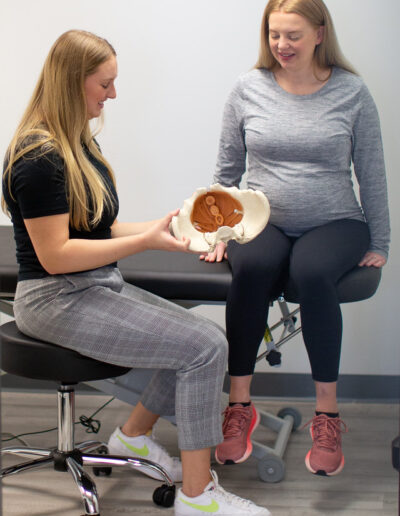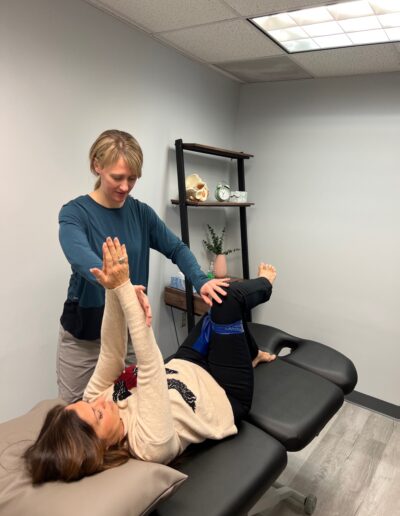PELVIC ORGAN PROLAPSE
Pelvic Organ Prolapse
Pelvic Organ Prolapse occurs when the pelvic organs, such as the bladder, uterus, or rectum, bulge into the vaginal wall due to weakened pelvic floor muscles and ligaments. This can lead to symptoms such as a feeling of pressure or fullness in the pelvis, urinary incontinence, and discomfort during sexual intercourse. It’s important to seek evaluation and assessment for proper diagnosis and to discuss appropriate treatment options with a healthcare professional.
What Causes Pelvic Organ Prolapse?
Pelvic organ prolapse can be caused by various factors, including pregnancy and childbirth, obesity, chronic constipation, chronic coughing, and conditions that increase intra-abdominal pressure. Genetic predisposition, menopause, and aging can also play a role. However, regardless of the cause, consulting a healthcare professional is crucial. They can provide an accurate diagnosis and a personalized treatment plan, ensuring you receive the best care for your condition.
Your First Visit for Pelvic PT
When you go to pelvic physical therapy for pelvic organ prolapse, you can expect the therapist to conduct a comprehensive and gentle assessment of your condition. The therapist will take the time to listen to your concerns and will work with you to understand your medical history and any previous treatments you may have had. This may include a compassionate discussion about your symptoms and how they impact your daily life.
During the assessment, the therapist will thoroughly evaluate your pelvic floor muscles, including their strength, flexibility, and coordination. This process is designed to be gentle and respectful of your comfort and privacy.
Following the assessment, the therapist will collaborate with you to develop a personalized treatment plan tailored to your specific needs. This plan may include pelvic floor exercises, biofeedback training, and lifestyle modifications to manage your symptoms effectively.
Your therapist will provide you with education and support throughout the process. You will be given personalized guidance on proper body mechanics and practical strategies to minimize intra-abdominal pressure, empowering you to take an active role in your care.
Overall, the goal of the first visit is to ensure that you feel safe, supported, and well-informed about your treatment plan. The therapist is dedicated to creating a comfortable and compassionate environment where you can discuss your concerns and work together towards improving your pelvic health.
The team of professionals at Cray Physical Therapy has extensive experience in treating pelvic floor disorders and understands the challenges of these conditions. They are committed to providing comprehensive care and work closely with the healthcare team to ensure optimal patient care.
Learn more
- Endometriosis
- Incontinence
- Pelvic Organ Prolapse
- Pelvic Pain
- Perinatal- Prenatal/Postnatal
Cray Physical Therapy Center for Pelvic Health. The Center for Pelvic Health is located at 1681 Washington St., in the same building as Cray Physical Therapy, just directly across the hall.
Address: 1681 Washington St., Suite 1, Braintree, MA 02184
Schedule an appointment today.
Phone: 339-987-4856
Why Choose Us?
Our experts have more than 22 years of combined experience in physical therapy. We understand that every patient is unique, so we offer customized and individualized care plans tailored to meet the specific needs of each individual. This personalized approach ensures you feel valued and understood throughout your therapy journey. We have personally benefited from physical therapy and witnessed firsthand its positive impact on our loved ones’ quality of life. Our therapists are sensitive to how specific pelvic dysfunctions can embarrass or make patients feel vulnerable. Still, they approach each patient with compassion and understanding to help them feel at ease. We are committed to providing the highest quality care to help you achieve your goals and improve your overall well-being.
Schedule an appointment today.
What are our patients saying?
“Within ten minutes of my first session, I felt I could breathe. Hearing that my issues could be corrected with physical therapy immediately left me feeling less alone. Cyndi, too, is a mother; she’s been through this journey and makes you feel like you have a teammate helping you every step. If you’re asking me, pelvic floor therapy with Cyndi should be a part of every woman’s postpartum journey.” ~ Ashlee



